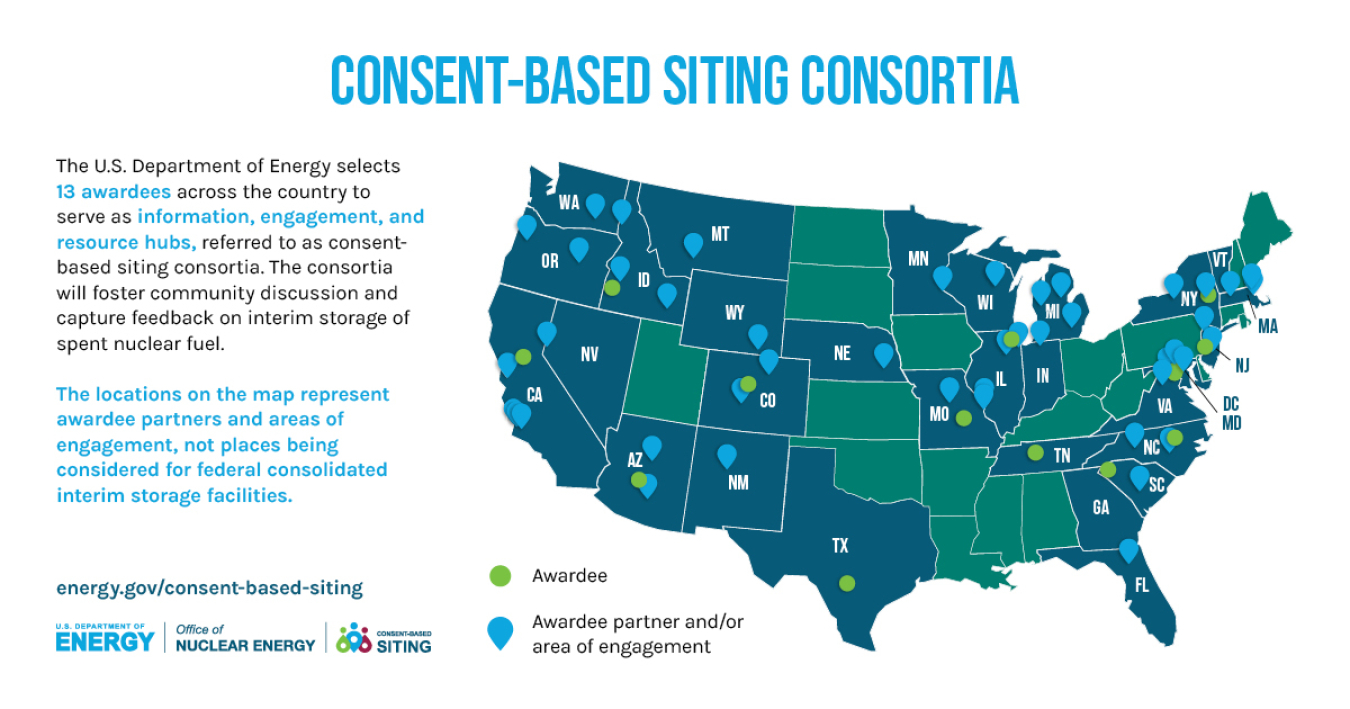Funding Provides Engagement and Training Resources for Communities Interested in Learning More About Interim Storage

WASHINGTON, D.C. — The U.S. Department of Energy (DOE) today announced $26 million in funding for groups of university, nonprofit, and private-sector partners that will work with communities interested in DOE’s community-centered approach to storing and disposing of spent nuclear fuel, a process known as consent-based siting. DOE, along with these consortia, will continue working with communities to ensure transparency and local support. At the same time, DOE is also advancing research and development for the long-term disposition of the fuel used to create nuclear power, a critical component of reaching President Biden’s goals of a 100% clean electric grid by 2035 and a net-zero economy by 2050.
“It is vital that, as DOE works to be good stewards of the nation’s spent nuclear fuel, we do right by communities in the siting process and includes them in the decision-making at the outset,” said U.S. Secretary of Energy Jennifer M. Granholm. “This funding will help DOE learn from and involve communities across the country in the consent-based siting process, answer questions and concerns, and develop an understanding so that we are good neighbors even before moving in.”
Consent-based siting is an approach to siting facilities that focuses on the needs and concerns of people and communities and centers equity and environmental justice. Communities participate in the process by working through a series of phases and steps with the Department, helping them determine whether and how hosting a facility to manage spent nuclear fuel is aligned to their goals. The process consists of three stages: planning and capacity building, site screening and assessment, and negotiation and implementation.
DOE is currently in the first stage and, consistent with that, is not currently soliciting volunteer communities to host Federal consolidated interim storage facilities as part of this funding opportunity.
DOE competitively selected 13 geographically and institutionally diverse awardees—representing 12 states and the District of Columbia—who will engage with additional partners and communities, expanding the impact of these awards and furthering the conversation around consolidated interim storage of spent nuclear fuel.
Awardees will represent a consent-based siting consortium, and they will collectively help the Department facilitate engagement activities and dialogue. They will each lead inclusive community and stakeholder engagement efforts, elicit public feedback to refine the Department’s consent-based siting process, and develop strategies that support mutual learning. Throughout this process, DOE and the consent-based siting consortia will work together to build equity and environmental justice principles into the engagement processes.
The project teams will each receive about $2 million and represent diverse organizations, a makeup that DOE hopes will enable a broad spectrum of perspectives and approaches. The preliminary project teams that will receive the awards are:
- American Nuclear Society (IL) as the lead, with South Carolina Universities Research and Education Foundation (SC), Northern Arizona University (AZ), University of New Mexico (NM), South Carolina State University (SC), and City College of New York (NY) as partners.
- Arizona State University (AZ)
- Boise State University (ID) as the lead, with the National Tribal Energy Association, Arizona State (AZ), Colorado State (CO), Idaho State (ID), Montana State (MT), University of Idaho (ID), University of Wyoming (WY), and University of Michigan (MI) as partners.
- Clemson University (SC) as the lead, with South Carolina Universities Research and Education Foundation (SC) as a partner.
- Energy Communities Alliance (DC)
- Good Energy Collective (CA) as the lead, with the University of Notre Dame (IN) as a partner.
- Holtec International (NJ) as the lead, with University of Florida (FL), McMahon Communications (MA), Agenda Global (DC), American Nuclear Society (IL), and Nuclear Energy Institute (DC) as partners.
- Keystone Policy Center (CO) as the lead, with Social and Environmental Research Institute, GDFWatch (UK), and the National Association of Regional Councils (DC) as partners.
- Missouri University of Science & Technology (MO) as the lead, with University of Missouri - Columbia (MO), University of Illinois (IL), Taylor Geospatial Institute (MO), and St. Louis University (MO) as partners.
- North Carolina State University (NC) as the lead, with the yak titʸu titʸu yak tiłhini Northern Chumash Tribe of San Luis Obispo County and Region (CA), Mothers for Nuclear (CA), and the Tribal Consent Based Coalition - Diablo Canyon Nuclear Power Plant (CA) as partners.
- Rensselaer Polytechnic Institute (NY) as the lead, with Schenectady Foundation (NY) as a partner.
- Southwest Research Institute (TX) as the lead, with Deep Isolation (CA), Westra Consulting (NE), Community Transition Planning (MI), Prairie Island Indian Community Tribal Nation (MN), Xcel Energy (MN), and Decommissioning Plant Coalition (DC) as partners.
- Vanderbilt University (TN) as the lead, with Rutgers University (NJ) and Oregon State University (OR) as partners.
Today’s announcement follows DOE’s first update to the Consent-Based Siting Process for Federal Consolidated Interim Storage of Spent Nuclear Fuel in April.
###